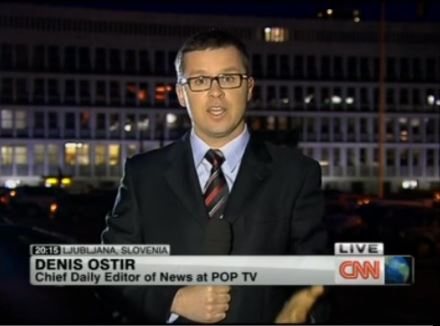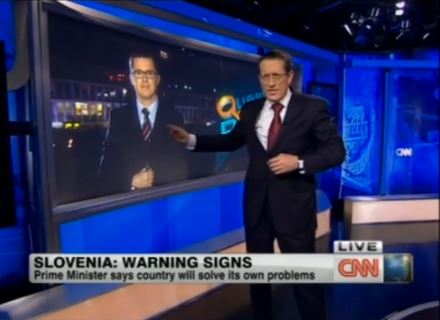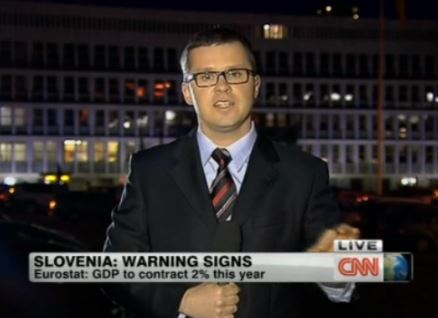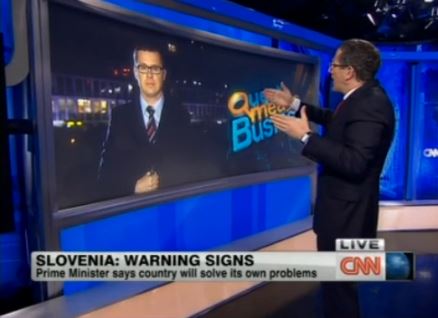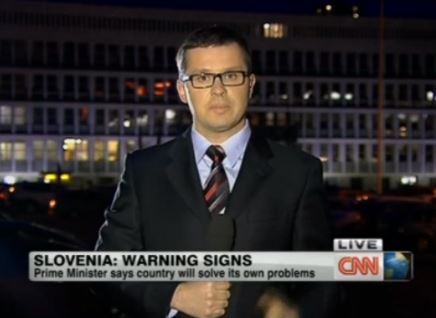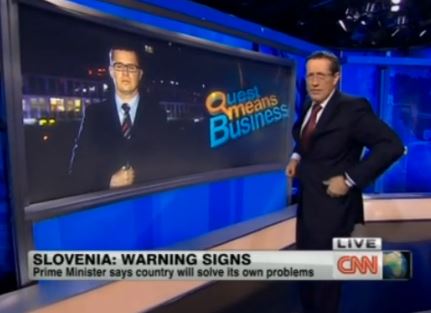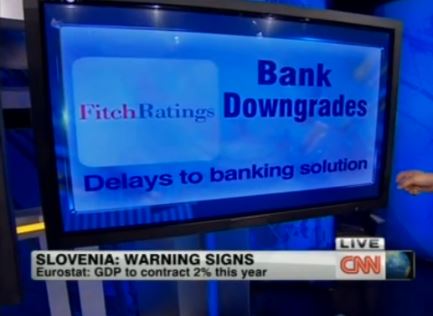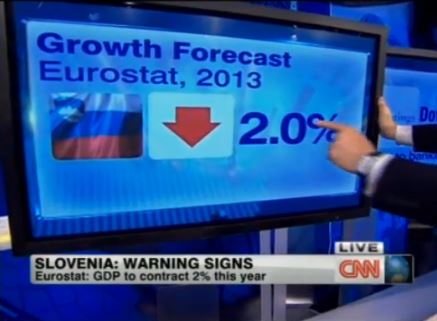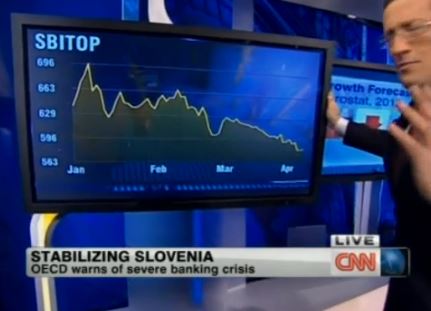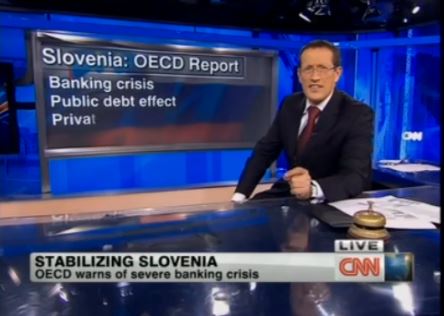Slovenija na CNN v oddaji Quest Means Business je zaradi gospodarske krize doživela kar nekaj minutno pozornost. V oddajo se je v živo iz Ljubljane vklopil Denis Oštir, novinar POP TV-ja, ki je odlično opravil svoje delo, saj v precej omejenem času predstavil gospodarsko situacijo v Sloveniji in se precej dobro navezal na Questovo prejšnje besedilo.
Na koncu ga je pohvalil tudi Richard Austin Quest. Oštirju se je zgodil tudi zelo zabaven pripetljaj in sicer CNN ga je “utišal”, saj je začel govoriti Quest. Stvar je izgledala precej zabavno je pa res, da je za ta majčken problem pravzaprav kriva satelitska zveza, ki ima majčken zamik pri prenosu.
Kako je vse skupaj ob 20.10 (CET) izgledalo pa v nekaj zaslonskih posnetkih posnetkih spodaj.
Coming up next, Slovenia tells Europe, “We’ll fix our own problems.” And all that happens while the OECD has warned of a major banking crisis. Is Slovenia next?
(RINGS BELL)
(COMMERCIAL BREAK)
QUEST: Slovenia’s prime minister says her country will do everything it can to solve its problems alone. Speaking in Brussels, Alenka Bratusek played down rumors that Slovenia will be the next eurozone state to ask for help, insisting the country’s working night and day to stabilize its banking sector.
(BEGIN VIDEO CLIP)
ALENKA BRATUSEK, PRIME MINISTER OF SLOVENIA (through translator): Those who have been speculating about Slovenia lately, I’d like to address now. Please assess Slovenia with facts and figures and not with speculation.
My message is that Slovenia is a stable and strong country, probably stronger than many other European countries.
(END VIDEO CLIP)
QUEST: The OECD’s warned that Slovenia’s facing a severe banking crisis driven by excessive risk-taking. The country’s already bailed out its top bank, which are mainly estate-owned. Now, the OECD says that’s pushing up the country’s public debt quite strongly.
It recommends a survival of the fittest approach, privatizing the best-performing banks — this is according to the OECD — and allowing non- viable ones to fail.
Slovenia is showing some warning signs of a looming crisis. Now, this is the problem: the banking crisis, the public debt effect, privatize or wind-down those banks. But back into the library and you will see what I’m talking about.
Look at the major stock index, the SBI. Now, it’s down 16.5 percent from its year high at the beginning of the year. This at a time, of course, where other major indices, maybe the FTSE and others, have been rising, showing a gain of 8 through 10 percent. So, there’s clearly market pressure within equities.
Eurostat says Slovenia’s GDP will fall 2 percent this year. That’s on top of the 2.3 percent last year. Double dip, second recession within four years.
And if all this wasn’t sort of feeding frenzy, then Fitch has downgraded the banks and says five Slovenian banks and says that reflects the ongoing delays in solving the problems in the banking sector. But the real issue, of course, is perception. And no sooner had Cyprus received its bailout terms, then the markets, like “Jaws” and like sharks, we’re looking for the next victim.
Denis Ostir is the chief daily editor of news at Slovenia’s POP TV, joins me now from the capital, Ljubljana. Denis, on this program, we have had people, like Axel Weber, who basically say Slovenia could well be next. In the capital, what do they say and how concerned are they?
DENIS OSTIR, CHIEF DAILY EDITOR OF NEWS, POP TV: Well, people of course are concerned, mainly because of what you just said, this GDP is — has been shrinking. It has been shrinking since 2009.
It dipped 10 percent the first year, and now it’s going down, down, down, and the forecast for next year and the year after are also not bright. In 2014, the economy will be flat, and only in 2015 we’ll be able to see slight growth.
The biggest issue here is, like you’ve said, the banks. They hold about 9 billion euros worth of bad debt. Just to put it in perspective, 9 billion is roughly the annual budget of the whole country. And as you’ve said, two of those major banks are state-owned. So, it’s going to be the taxpayers who are going to be bailing out these two major banks.
QUEST: Do the people feel that we are unfairly — not us personally, here on QUEST MEANS BUSINESS, but that the markets and that the commentators are unfairly beating up, creating a self-fulfilling prophecy in Slovenia?
OSTIR: There’s a lot of talk about that, but honestly, people are concerned. They say the situation is serious, but it’s not dire, like some people are trying to say. Just for example, the debt of the country is about 54 percent of GDP. If you compare that to other European countries, you’re going to see there is still room, if the government wants, to get some more additional money.
It is going to be expensive. The ten-year — the yield on the ten- year bond is over — has been over 6 percent for the last —
QUEST: But — right, but — on that point, as Slovenia moves forward, was there almost a sense that we are next after Cyprus? And crucial to that point, were people worried when they heard about bank deposits being withheld? The haircut?
OSTIR: Yes, that is a good point. Like you’ve said, people are concerned that things will happen like they did in Cyprus and Greece. We’ve all seen pictures from there.
But interestingly, “Delo,” which is the main daily newspaper in Slovenia, just had a poll, and about 51 percent of people still believe that their savings in the big banks are safe, even though 48 percent, on the other hand, believe a bailout is imminent.
What I’d also like to point out is the unemployment rate. That’s also one thing which is worrying people. We’re currently at about 12 percent unemployment, and the forecasts are bad. It’s going to go up to 13.5 percent in the next two years, which means 123,000 people right now in Slovenia, which is a country of 2 million, is looking for jobs.
On the other hand, only 767 jobs are available. So all this combined, people are worried. They do believe they’re being unfairly treated and there’s a lot of hype being created that Slovenia will be the next one. But like I’ve said, they believe that the situation is serious, but it’s not as dire as some are trying to persuade them that it is.
QUEST: Denis, thank you for joining us from the Slovenian capital, very good up-sum, there, of the situation. David Bloom is head of global foreign exchange strategy at HSBC. David, I am not going to stand here and ask you is Slovenia next.
DAVID BLOOM, GLOBAL HEAD OF FOREIGN EXCHANGE STRATEGY, HSBC: Good.
QUEST: But is Slovenia next?
BLOOM: Well, the main point is one of contagion.
QUEST: Right.
vir slik: live stream CNN International
vir transcripta: http://edition.cnn.com/TRANSCRIPTS/1304/09/qmb.01.html
